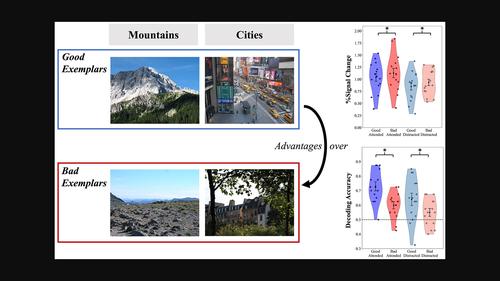当前位置:
X-MOL 学术
›
Eur. J. Nerosci.
›
论文详情
Our official English website, www.x-mol.net, welcomes your feedback! (Note: you will need to create a separate account there.)
Is attention necessary for the representational advantage of good exemplars over bad exemplars?
European Journal of Neroscience ( IF 3.4 ) Pub Date : 2024-02-26 , DOI: 10.1111/ejn.16291 Zhenan Shao 1, 2 , Diane M. Beck 1, 2
European Journal of Neroscience ( IF 3.4 ) Pub Date : 2024-02-26 , DOI: 10.1111/ejn.16291 Zhenan Shao 1, 2 , Diane M. Beck 1, 2
Affiliation

|
Real‐world (rw‐) statistical regularities, or expectations about the visual world learned over a lifetime, have been found to be associated with scene perception efficiency. For example, good (i.e., highly representative) exemplars of basic scene categories, one example of an rw‐statistical regularity, are detected more readily than bad exemplars of the category. Similarly, good exemplars achieve higher multivariate pattern analysis (MVPA) classification accuracy than bad exemplars in scene‐responsive regions of interest, particularly in the parahippocampal place area (PPA). However, it is unclear whether the good exemplar advantages observed depend on or are even confounded by selective attention. Here, we ask whether the observed neural advantage of the good scene exemplars requires full attention. We used a dual‐task paradigm to manipulate attention and exemplar representativeness while recording neural responses with functional magnetic resonance imaging (fMRI). Both univariate analysis and MVPA were adopted to examine the effect of representativeness. In the attend‐to‐scenes condition, our results replicated an earlier study showing that good exemplars evoke less activity but a clearer category representation than bad exemplars. Importantly, similar advantages of the good exemplars were also observed when participants were distracted by a serial visual search task demanding a high attention load. In addition, cross‐decoding between attended and distracted representations revealed that attention resulted in a quantitative (increased activation) rather than qualitative (altered activity patterns) improvement of the category representation, particularly for good exemplars. We, therefore, conclude that the effect of category representativeness on neural representations does not require full attention.
中文翻译:

是否有必要关注好范例相对于坏范例的代表性优势?
人们发现,现实世界(rw-)的统计规律或对一生中所学到的视觉世界的期望与场景感知效率有关。例如,基本场景类别的良好(即高度代表性)样本(rw统计规律的一个例子)比该类别的不良样本更容易被检测到。同样,在场景响应感兴趣区域,特别是在海马旁区域(PPA),好的样本比坏的样本获得更高的多元模式分析(MVPA)分类精度。然而,尚不清楚观察到的良好范例优势是否依赖于选择性注意,甚至是否被选择性注意所混淆。在这里,我们询问观察到的良好场景样本的神经优势是否需要充分关注。我们使用双任务范例来操纵注意力和样本代表性,同时使用功能磁共振成像(fMRI)记录神经反应。采用单变量分析和MVPA来检验代表性的效果。在关注场景的条件下,我们的结果重复了一项早期的研究,表明好的范例比坏的范例引起的活动更少,但类别表示更清晰。重要的是,当参与者因需要高注意力负荷的连续视觉搜索任务而分心时,也观察到了好范例的类似优势。此外,注意力集中和分散注意力的表征之间的交叉解码表明,注意力导致了类别表征的定量(增加的激活)而不是定性(改变的活动模式)改善,特别是对于好的范例。因此,我们得出的结论是,类别代表性对神经表征的影响不需要充分关注。
更新日期:2024-02-26
中文翻译:

是否有必要关注好范例相对于坏范例的代表性优势?
人们发现,现实世界(rw-)的统计规律或对一生中所学到的视觉世界的期望与场景感知效率有关。例如,基本场景类别的良好(即高度代表性)样本(rw统计规律的一个例子)比该类别的不良样本更容易被检测到。同样,在场景响应感兴趣区域,特别是在海马旁区域(PPA),好的样本比坏的样本获得更高的多元模式分析(MVPA)分类精度。然而,尚不清楚观察到的良好范例优势是否依赖于选择性注意,甚至是否被选择性注意所混淆。在这里,我们询问观察到的良好场景样本的神经优势是否需要充分关注。我们使用双任务范例来操纵注意力和样本代表性,同时使用功能磁共振成像(fMRI)记录神经反应。采用单变量分析和MVPA来检验代表性的效果。在关注场景的条件下,我们的结果重复了一项早期的研究,表明好的范例比坏的范例引起的活动更少,但类别表示更清晰。重要的是,当参与者因需要高注意力负荷的连续视觉搜索任务而分心时,也观察到了好范例的类似优势。此外,注意力集中和分散注意力的表征之间的交叉解码表明,注意力导致了类别表征的定量(增加的激活)而不是定性(改变的活动模式)改善,特别是对于好的范例。因此,我们得出的结论是,类别代表性对神经表征的影响不需要充分关注。



























 京公网安备 11010802027423号
京公网安备 11010802027423号